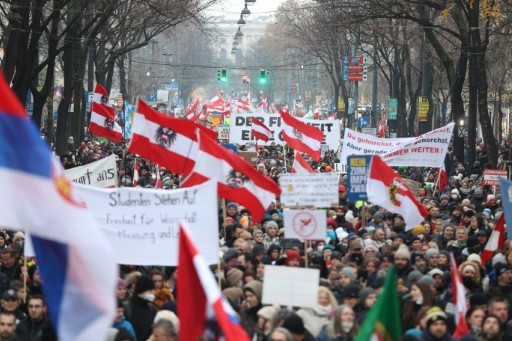Compulsory vaccination rules come into force in Austria

From Saturday, Austrians over the age of 18 must be vaccinated against COVID-19 or face the possibility of a heavy fine, an unprecedented measure in the European Union. The new measure, adopted on January 20 by Parliament, was signed into law by President Alexander Van der Bellen on Friday, the culmination of a process that began in November in the face of the rapid spread of the Omicron variant.
The government decided to pursue its new tougher approach despite criticism within the country. "No other country in Europe is following us on compulsory vaccines," said Manuel Krautgartner, who has campaigned against the new approach.
Despite the threat of such a drastic measure, the vaccination rate in Austria has still failed to take off, languishing below the levels seen in France or Spain. Vienna vaccination centers remain relatively quiet. "We are far from reaching maximum capacity, things are completely stagnating," Stefanie Kurzweil, of the humanitarian association, Arbeiter Samariter Bund, which oversees one of these sites, told AFP a few days ago.
Melanie, a 23-year-old waitress who preferred not to give her second name at the centre to get her booster jab, said she was mainly there to avoid ending up "locked up at home".
Non-vaccinated people are currently excluded from restaurants, sports and cultural venues. But from now on they will also be subject to fines, which Melanie said was "unhealthy".
The law applies to all adult residents with the exception of pregnant women, those who have contracted the virus within the past 180 days and those with medical exemptions. Checks will begin from mid-March, with sanctions ranging from 600 to 3,600 euros ($690-$4,100).
They will, however, be lifted if the person fined gets vaccinated within two weeks. Waiting in the queue, others say they are in favor of vaccination for all. "We would have finished a long time ago (with the pandemic) if everyone had been vaccinated", said legal worker, Angelika Altmann.
More than 60 percent of Austrians support the measure, according to a recent survey, but large swathes of the population remain strongly opposed. For several weeks after the announcement of the new law, tens of thousands of people took to the streets to protest against what they regard as a radical and draconian policy.
Critics have also questioned the need for compulsion given the far milder nature of the Omicron variant. Conservative Chancellor Karl Nehammer, who leads the Alpine country with the environmentalist Greens, also announced at the same time a relaxation of earlier Covid-19 restrictions.
But for Health Minister Wolfgang Mueckstein, compulsory vaccination is aimed at both protecting the country against new waves and fighting new variants. Vaccination passes are now a reality in an increasing number of countries for certain professions or activities. In Ecuador, it is compulsory, including for children over the age of five, a world first.
Before that, two authoritarian states in Central Asia Tajikistan and Turkmenistan mandated vaccination, as did Indonesia, even if less than half the population is actually vaccinated.
